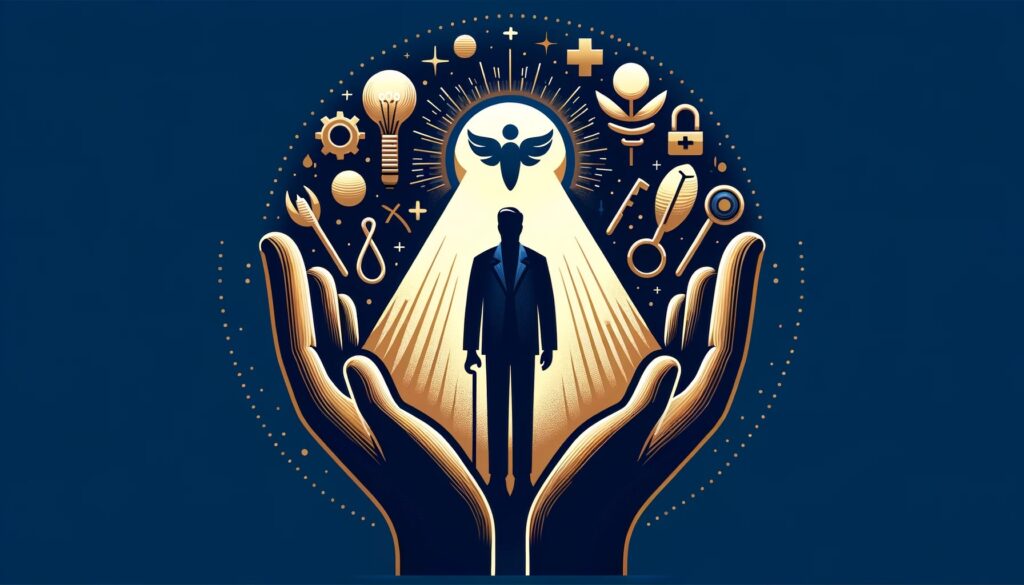The Unspoken Struggle – Understanding Men’s Mental Health
In a world where strength and stoicism are often celebrated as hallmarks of manhood, the
subject of men’s mental health frequently remains shrouded in silence. Yet, it’s a topic of
undeniable importance, affecting not just individuals but families and communities at large.
This article aims to shed light on this critical issue, breaking down barriers and fostering a
more profound understanding of men’s mental health challenges.
Mental health issues do not discriminate; they can affect anyone, regardless of gender.
However, for men, admitting to emotional difficulties and seeking help can sometimes feel
like a journey through uncharted waters. Cultural norms and societal expectations have long
dictated a narrative where men must “tough it out” or “man up,” often at the expense of their
mental well-being. It’s time to change the conversation, to acknowledge that mental health is
as vital as physical health, and that seeking help is not a sign of weakness, but rather one of
courage and strength.
As we embark on this exploration of men’s mental health, our goal is to provide a
comprehensive guide that not only addresses common mental health issues faced by men
but also delves into the reasons why these issues are often overlooked. We’ll offer practical
strategies for managing mental health, discuss the importance of seeking professional help,
and highlight the crucial role of loved ones in providing support. This guide is a step towards
understanding, empathy, and action – essential components in the journey towards better
mental health for all men.
Common Mental Health Issues Faced by Men

In addressing men’s mental health, it’s crucial to start by understanding the most common
mental health issues that men face. These challenges are varied and can significantly
impact a man’s life, yet they often go unacknowledged or untreated due to a variety of
factors, including stigma and lack of awareness.
Depression: Often perceived as just a prolonged feeling of sadness, depression in men can
manifest in various forms. It’s not uncommon for it to appear as irritability, anger, or even
engaging in risky activities. Traditional symptoms like persistent feelings of hopelessness,
changes in appetite, and loss of interest in activities once enjoyed are also prevalent. It’s a
widespread misconception that depression is a sign of emotional weakness; in reality, it is a
complex medical condition requiring attention and care.
Anxiety Disorders: Including conditions like panic disorder and phobias, anxiety disorders
in men are often masked or go unnoticed. Symptoms can range from persistent worry and
restlessness to physical manifestations like heart palpitations and shortness of breath. Men
might not always recognize these symptoms as signs of anxiety, leading to underdiagnosis
and undertreatment.
Attention-Deficit/Hyperactivity Disorder (ADHD): Traditionally associated with children,
ADHD continues to affect many men into adulthood. Symptoms like difficulty concentrating,
hyperactivity, and impulsiveness can significantly impact personal and professional life.
Unfortunately, the perception of ADHD as a childhood disorder means that adult men often
don’t receive the necessary support and treatment.
Schizophrenia: This serious mental disorder is often diagnosed in men in their late teens to
early 30s. Characterized by distorted thinking, hallucinations, and reduced social
engagement, schizophrenia requires comprehensive medical management. Early diagnosis
and treatment can significantly improve outcomes.
Understanding these issues is the first step in addressing men’s mental health. Recognizing
symptoms, acknowledging the need for help, and breaking down the barriers of stigma are
essential in fostering a more supportive environment for men’s mental health.
Why Mental Health is Often Overlooked in Men

In exploring why mental health issues are frequently overlooked or underreported in men, we
delve into a complex web of societal and cultural factors. These elements play a significant
role in shaping perceptions and attitudes toward mental health, especially among men.
Cultural Expectations and Masculinity: From a young age, many men are taught to
embody the traits of strength, stoicism, and self-reliance. Expressing emotions or admitting
to struggles is often viewed as a sign of weakness. This deeply ingrained belief system can
make it challenging for men to acknowledge their mental health issues, let alone seek help.
Stigma and Stereotypes: The stigma surrounding mental health is a significant barrier. Men
may fear being judged or perceived as less capable if they open up about their mental health
struggles. This fear of judgment can be paralyzing, preventing men from seeking the help
they need.
Lack of Awareness and Understanding: Often, there is a lack of awareness about mental
health symptoms and their impact. Men may not recognize the signs of mental health issues
or understand the importance of seeking help. This lack of understanding can lead to a delay
in treatment or complete avoidance of addressing the issue.
The Role of Socialization: Social norms and expectations heavily influence how men
perceive and deal with their mental health. Men are often encouraged to “tough it out” or
“deal with it” rather than expressing vulnerability or seeking support.
To effectively support men’s mental health, it is crucial to challenge these stereotypes and
create a culture that encourages open dialogue and acceptance. Redefining strength to
include vulnerability and emotional expression is a vital step in changing how we approach
men’s mental health.
Need Help?
Managing Mental Health: Strategies for Men

Addressing mental health is not just about recognizing the issues but also about actively
engaging in strategies that promote mental well-being. For men grappling with mental health
challenges, there are numerous approaches to managing and improving their mental state.
Seek Professional Help: One of the most effective steps in managing mental health is
seeking professional assistance. Therapists, counselors, and psychiatrists can provide
invaluable support and guidance. They offer a safe space to discuss concerns and work
through issues without judgment.
Develop Healthy Coping Skills: Learning and practicing healthy coping mechanisms is
vital. This can include:
● Setting Realistic Goals: Breaking down tasks into smaller, manageable steps can
reduce feelings of overwhelm.
● Building a Support Network: Having a group of friends, family, or a support group
where men can share their experiences and feelings is crucial.
● Engaging in Physical Activity: Regular exercise has been shown to have a positive
impact on mood and mental health.
● Practicing Mindfulness and Meditation: These practices can help in managing
stress and improving overall mental well-being.
Lifestyle Changes: Simple changes in daily life can make a significant difference. This
includes ensuring adequate sleep, maintaining a nutritious diet, and engaging in hobbies and
activities that bring joy.
Recognizing and Acting on Warning Signs: Being aware of changes in one’s own mental
state and taking action when symptoms appear is critical. This could mean reaching out to a
professional when noticing persistent sadness, increased anxiety, or other concerning
symptoms.
By incorporating these strategies into daily life, men can take significant steps toward
improving their mental health. It’s about creating a balanced lifestyle that supports both
physical and mental well-being.
The Importance of Seeking Professional Help

One of the most crucial steps in managing mental health is recognizing when it’s time to
seek professional help. This step is often where many men face the biggest hurdle due to
societal expectations and personal reservations. However, professional help can be a
turning point, offering new perspectives, strategies, and support that can significantly
improve mental health.
Recognizing the Signs: It’s important to be aware of the signs that might indicate the need
for professional help. These can include persistent feelings of sadness or hopelessness,
significant changes in mood or behavior, substance abuse, or thoughts of self-harm.
Acknowledging these signs is not a sign of weakness but a critical step in taking control of
one’s health.
Benefits of Professional Help: Mental health professionals offer a range of therapies and
treatments tailored to individual needs. These can include talk therapy, cognitive-behavioral
therapy, medication, or a combination of these. Professional help provides a structured
approach to understanding and managing mental health challenges, equipping individuals
with tools and strategies for long-term well-being.
Overcoming Stigma and Misconceptions: Seeking professional help is often stigmatized,
particularly among men. It’s vital to challenge these misconceptions and understand that
mental health is a critical component of overall well-being. Professional help is not just for
crises but is also beneficial for ongoing mental health maintenance and support.
Taking the First Step: Making the first appointment can be the most challenging part. It’s
helpful to remember that mental health professionals are trained to provide a non-
judgmental, supportive environment. Their goal is to help, guide, and support individuals
through their mental health journey.
Seeking professional help is a courageous and essential step in managing mental health. It’s an investment in oneself, leading to improved mental well-being and quality of life.
The Role of Loved Ones in Supporting Men’s Mental Health
The support of loved ones plays a pivotal role in the mental health journey of men. Family,
friends, and even colleagues can provide a critical network of support, understanding, and
encouragement. This section highlights how loved ones can positively impact the mental
well-being of the men in their lives.
Creating a Safe Space for Open Communication: One of the most important ways to
support men’s mental health is by fostering an environment where they feel safe to express
their feelings and concerns. Encouraging open and honest communication, free from judgment
or stigma, is essential.
Being an Active Listener: Sometimes, the best support is simply being there to listen.
Active listening involves giving full attention, acknowledging feelings, and offering support
without necessarily trying to “fix” the problem. It’s about understanding rather than providing
solutions.
Encouraging Professional Help: Loved ones can play a significant role in encouraging
men to seek professional help. This could involve helping to research therapists, offering to
accompany them to an appointment, or just providing moral support.
Providing Information and Resources: Sharing information about mental health, including
articles, books, or contacts of mental health professionals, can be helpful. It’s important to do
this sensitively and without pressure.
Regular Check-ins and Involvement: Regular contact, whether through phone calls,
messages, or in-person visits, can make a big difference. Being involved and showing
genuine concern and interest in their well-being can be very reassuring.
The involvement of loved ones in the journey towards better mental health is invaluable.
Their support can make a crucial difference in helping men to navigate the challenges of
mental health issues and in seeking the help they need.
Conclusion
As we conclude this comprehensive guide on men’s mental health, it’s crucial to remember
that mental health is a journey, not a destination. Each step taken towards understanding,
acknowledging, and addressing mental health issues is a step towards a healthier, more
fulfilling life. For men struggling with mental health challenges, know that you are not alone,
and seeking help is a sign of strength and resilience.
To the loved ones of men facing these challenges, your support, understanding, and
encouragement can make a world of difference. Together, by breaking down the barriers of
stigma and opening up channels of communication and support, we can foster a society
where mental health is openly discussed and adequately addressed.
If you or someone you know is struggling with mental health issues, we at Hampton Health
are here to help. Our team of professionals is dedicated to providing compassionate,
personalized care to support you on your journey to mental wellness. Reach out to us, and
let’s take the first step together towards a healthier, happier you.
Contact Hampton Health today for support and guidance on your mental health journey. Your mental well-being is our priority, and we are here to help you every step of the way.
Frequently Asked Questions (FAQs) About Men’s
Mental Health
What are the most common mental health issues faced by men?
The most common mental health issues among men include depression, anxiety disorders,
Attention-Deficit/Hyperactivity Disorder (ADHD), and schizophrenia. Each of these conditions
manifests differently and can have a significant impact on a man’s life.
Why is mental health often overlooked in men?
Mental health in men is often overlooked due to societal and cultural expectations, stigma
surrounding mental illness, a lack of awareness, and the tendency for men to underreport
their emotional struggles. These factors contribute to a reluctance to seek help.
How can men better manage their mental health?
Men can better manage their mental health by seeking professional help, developing healthy
coping skills (like setting realistic goals and building a support network), engaging in physical
activity, practicing mindfulness, and making positive lifestyle changes.
What are the signs that a man should seek professional mental health support?
Signs that a man should seek professional help include persistent feelings of sadness or
hopelessness, significant changes in mood or behavior, substance abuse, difficulty in coping
with daily activities, and thoughts of self-harm or suicide.
What role can loved ones play in supporting a man’s mental health?
Loved ones can play a crucial role by creating a safe and non-judgmental space for open
communication, being active listeners, encouraging professional help, sharing information
and resources, and staying involved and supportive.
How can societal attitudes towards men’s mental health be changed?
Societal attitudes can be changed by promoting open discussions about mental health,
challenging stereotypes and stigma, increasing public awareness and education, and
encouraging men to share their experiences and seek help without fear of judgment.
What are some warning signs of mental health
problems in men?
Warning signs of mental health problems in men can include persistent sadness, irritability,
withdrawal from activities, drastic changes in mood or behavior, and thoughts of suicide.
Are men less likely to seek help for their mental health problems?
Yes, research shows that men are less likely to seek help for their mental health problems
compared to women, often due to social stigma and perceived gender expectations.
Are there specific resources available for men to
support their mental health?
Yes, there are resources specifically tailored to support men’s mental health, including
hotlines, support groups, online forums, and mental health websites providing valuable
information and support for men.
What are some symptoms of depression and anxiety in men?
Symptoms of depression and anxiety in men can include persistent feelings of sadness,
hopelessness, irritability, fatigue, changes in sleep or appetite, and difficulty concentrating.
Where can men seek mental health treatment?
Men can seek mental health treatment from various sources including mental health
professionals, counseling centers, community mental health clinics, and through referrals
from their primary care physicians.
Are there 24-hour hotlines available for men in crisis or needing emotional support?
Yes, there are 24-hour hotlines and crisis lifelines available for men, providing access to
trained crisis counselors and immediate emotional support, such as the 988 suicide and
crisis lifeline.
How can men better support their mental health and well-being?
Men can better support their mental health and well-being by seeking professional help
when needed, engaging in physical activities, managing stress, maintaining social
connections, and being open to discussing their mental health concerns with trusted
individuals.
Why is understanding and supporting men’s mental health important?
Understanding and supporting men’s mental health is important as it helps in promoting
overall well-being, reducing the stigma around men’s mental health, and preventing tragic
outcomes such as suicide, which men are more likely to die by compared to women.
Do mental health conditions differ in men compared to women?
Yes, mental health conditions can differ in men compared to women in terms of symptoms,
prevalence, and help-seeking behaviors, which emphasizes the importance of addressing
men’s mental health specifically.




